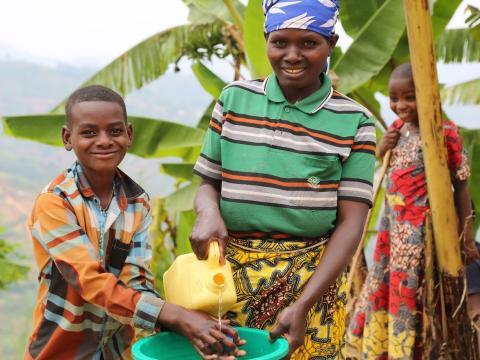Reclaiming Time with Access to Clean Water

“I’m overjoyed at the fact that we [now] have access to clean drinking water close to our home,” says Josephine, a wife and a mother to eight lovely children. As of three months ago, Josephine and her kids had to wake up at the crack of dawn to fetch water before getting her kids ready for school and heading off to the fields to farm, where she spends most of her time.
“We had to walk for an hour to the nearest water source and an hour back; carrying heavy jerrycans full of dirty water. This was done three times a day,” Josephine says. She and other community members in Gakenke District, spent a significant amount of time not only fetching the water, but also taking extra measures, like boiling it multiple times, to make it drinkable.
Every day families are gathering dirty, diseased water. They have no choice. There is no other option. From ponds shared with cattle to nearby streams full of all kinds of waste, the water collected does more harm than good. But it doesn't have to be this way.
“The water we fetched from the swamp often got us sick with various waterborne diseases, such as. diarrheal, cholera, and severe skin rashes... today we are in a much better place.”
Josephine now lives a mere 3-minute walk from a water point that was constructed by World Vision, in late May of this year (2019). This tap stand has been a dream come true for Josephine and her community. “I have enough time during the day to do chores and clean up around the house. I [also] have time to wash my kids' uniforms so that they look clean for school, which it fulfills me as a mother,” she says with a sigh of relief.
Not only is the water closer to their home, it is also affordable for her family. They pay only 10 RWF per jerrycan; which is equivalent to a penny. The community is no longer suffering from waterborne diseases, and children spend more time on their studies and playing with their friends, instead of walking 10 kilometers in search of water.
“I want to extend my gratitude to World Vision and their partners for thinking of us and improving our quality of life. May God bless them with more means, so that they can help more people get access to water," she added.